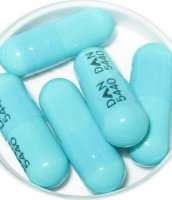Old antibiotic could be a new weapon to fight tuberculosis

(Medical Xpress) -- A cheap and safe antibiotic that is widely available in the developing world might have a new use as a tuberculosis (TB) treatment, according to new research.
TB kills almost 2 million people a year worldwide, and is increasingly becoming resistant to the antibiotics used to treat it, but there are few new drugs in the pipeline. Doxycycline was introduced in 1967 and is used to treat a wide range of bacterial infections, but until now has not been recognized as effective against TB. The new study, published in the American Journal of Respiratory and Critical Care Medicine, suggests that doxycycline might stop the bacteria from growing and also prevent the disease from damaging the lungs.
Last year, researchers at Imperial College London discovered that TB increases the production of an enzyme called MMP-1, and that this enzyme is responsible for destroying lung tissue.
Now they have found that doxycycline suppresses the production of the tissue-destroying enzyme in TB-infected human cells. They also found that doxycycline directly inhibits the growth of the bacteria in guinea pigs – a surprising result since the drug has been widely used as an antibiotic for over 40 years but has not been considered effective against TB.
“TB treatment has remained unchanged for over 30 years, and totally drug-resistant strains are emerging, so there’s a real need for new drugs.” said Dr. Paul Elkington, from the Department of Medicine at Imperial College London, who led the study. “Because doxycycline is cheap, safe and widely available throughout the developing world, it may be a useful new treatment for TB that can be used in resource-poor settings. Our results so far are promising but we have only looked at human cells and animal models. We hope to carry out a clinical trial soon to test whether doxycycline is effective at combating TB in patients.”
The researchers found further evidence for the antibiotic effect of doxycycline in TB bacteria grown in a liquid broth. The higher the concentration of doxycycline, the lower the rate of bacterial growth.
They also studied HIV-infected TB patients in South Africa to look for further evidence that MMP-1 is responsible for destroying lung tissue. They found that concentrations of this enzyme were suppressed in people with advanced HIV infection, explaining for the first time why such patients do not suffer from such extensive lung destruction when they get TB.
The Imperial team worked with collaborators at the University of Cape Town and the Health Protection Agency (HPA) at Porton Down. The research was funded by the National Institute for Health Research (NIHR), the Wellcome Trust, the NIHR Biomedical Research Centre at Imperial, and the HPA.
More information: NF Walker et al. ‘Doxycycline and HIV infection suppress tuberculosis-induced matrix metalloproteinases.’ American Journal of Respiratory and Critical Care Medicine, published online 16 February 2012. , doi:10.1164/rccm.201110-1769OC















